Senior Cat Kidney Health: Early Signs
Publish in Health el 30/06/2025 23:38
Recognizing Early Signs of Kidney Disease in Senior Cats
As our feline friends gracefully age, it's crucial to be aware of potential health concerns. One of the most common issues affecting senior cats is kidney disease. Early detection is key to managing the condition and improving your cat's quality of life. This article will help you understand the early warning signs and what to do if you notice them.

What is Kidney Disease?
Kidney disease occurs when the kidneys lose their ability to filter waste and excess fluid from the blood. Over time, this buildup of toxins can lead to serious health problems. While it can develop at any age, it's particularly prevalent in cats over 7 years old. There are several types of kidney disease, but they all share the common goal of impaired kidney function.
Early Warning Signs to Watch For
The good news is that kidney disease often has subtle early symptoms. Being observant is vital! Here are some key signs to look out for:
- Increased Thirst: A sudden increase in water consumption is often one of the first signs.
- Increased Urination: Your cat may urinate more frequently, sometimes in smaller amounts.
- Weight Loss: Even with a consistent appetite, your cat might start losing weight.
- Decreased Appetite: A loss of interest in food is a common symptom.
- Lethargy: Your cat may seem less playful and more tired than usual.
- Vomiting: Occasional vomiting can be a sign of kidney problems.
- Bad Breath: A distinct ammonia smell on your cat's breath can indicate kidney disease.
What to Do If You Suspect Kidney Disease
If you notice any of these signs, it's essential to schedule a vet appointment immediately. Your veterinarian can perform blood and urine tests to assess your cat's kidney function. Early diagnosis allows for prompt treatment and management. Treatment options may include dietary changes, medications to manage blood pressure and phosphorus levels, and fluid therapy. While there's no cure for kidney disease, with proper care, many cats can live comfortably for a significant period.
Proactive Care is Key
Regular veterinary checkups, especially for senior cats, are crucial for detecting kidney disease early. Maintaining a healthy weight, providing fresh water, and feeding a high-quality diet can also help support your cat's kidney health. By being proactive, you can help ensure your feline companion enjoys a long and happy life.





